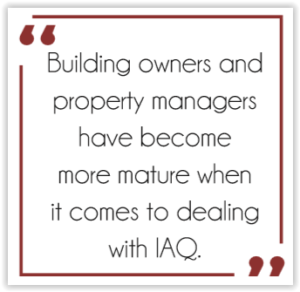Winds of Change
HOW HOUSTON WINS AT IAQ
 Earlier this year, I attended a conference where I had the opportunity to talk to people from other parts of the country who work in indoor air quality. I learned a lot about IAQ problems other cities are just starting to acknowledge, like certain approaches to dealing with mold. This surprised me because they were things that we have been dealing with in Houston for over 15 years. Due to the fact that we were dealing with mold so long ago, everyone in Texas seems to know the ins and outs of dealing with it.
Earlier this year, I attended a conference where I had the opportunity to talk to people from other parts of the country who work in indoor air quality. I learned a lot about IAQ problems other cities are just starting to acknowledge, like certain approaches to dealing with mold. This surprised me because they were things that we have been dealing with in Houston for over 15 years. Due to the fact that we were dealing with mold so long ago, everyone in Texas seems to know the ins and outs of dealing with it.
Over the last couple of years, I’ve seen how we’re beginning to reach that same level of general understanding when it comes to the importance of indoor air quality.
Building owners and property managers have become more mature when it comes to dealing with IAQ. Years ago, I would often get panicked calls when there was a problem or when tenants complained. Now, the calls I get often tend to be more proactive. I’m asked to walk the building and look for preventive opportunities from the mechanical, custodial, and tenant perspective to identify and stop problems before they can actually occur.
Now, I’ve been doing proactive IAQ surveys for 20 years, but for most of that time, I was only walking 7–10 buildings a year. In the last three years,  that number has grown to 20 buildings, with more to come. I see that as a sign that more and more owners and managers are trying to get ahead of the issues to prevent liability and exposure. The increase in proactive surveys goes along with a recent surge in demand for our indoor air quality management program.
that number has grown to 20 buildings, with more to come. I see that as a sign that more and more owners and managers are trying to get ahead of the issues to prevent liability and exposure. The increase in proactive surveys goes along with a recent surge in demand for our indoor air quality management program.
Several years ago, one of our clients asked for help creating an IAQ management program. We put the paperwork and processes together into one system that they could then use on every property they owned or managed. Using that system provided everyone at the company with the correct steps to take when faced with an IAQ problem. It helped them evaluate their systems, determine their response, and even provided simple guidance for the tenants on the “shared responsibility in IAQ.” It was pretty successful! And now, we’re getting calls for the IAQ management program again.
Establishing an IAQ management program is a powerful step in being proactive about the IAQ of your buildings, especially if you have multiple properties. Simply put, it assigns one person as the IAQ manager, and then parcels out the smaller (but critical) tasks to engineers, custodians, pest control staff, and others. Without an established IAQ management program, if you ask your team how to handle an IAQ matter, you’ll get varied answers. However, when you have a program in place and an individual who manages that program, there is only one answer and one direction to follow. And that’s a time-saving process.
This all signals an important change in the attitude of building owners and property managers, which makes me pretty happy. They’re not playing defense anymore and are instead trying to get ahead of the curve. I like being a problem-solver, and when more of my clients let me help them proactively, I call that a win!

